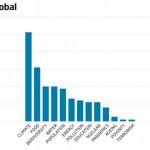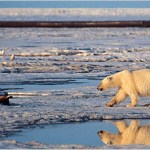Climate
When I created the Island of Doubt five years ago, I was fascinated by the battle between science and irrationality. I had just moved to the U.S., it would be several months before my work permit would be granted, and I needed an outlet to keep my writing skills sharp. Inspired in no small part by Chris Mooney's Intersection blog, I began posting weekly ruminations on the what I consider to be the "betrayal of the Enlightenment" so evident in my new home and elsewhere. Within a year or so, however, I began to focus almost exclusively on just one species of reality-denial: climate change…
From NASA climatologist Gavin Schmidt, in the Washington Post, discussing the value of computer climate models:
If the models are as flawed as critics say, Schmidt said, "You have to ask yourself, 'How come they work?' "
Indeed. Also of note is a comment from someone who doesn't share Schmidt's confidence:
Warren Meyer, a mechanical and aerospace engineer by training who blogs at www.climate-skeptic.com, said that climate models are highly flawed. He said the scientists who build them don't know enough about solar cycles, ocean temperatures and other things that can nudge the earth's…
Paul Krugman's feature in the New York Times covers it all. If you haven't familiarized yourself with the subject, then find 15 minutes to read it. Worth noting: the debate between Krugman and James Hansen over the merits of cap and trade persists, but Krugman appears to at least grant Hansen recognition that burning coal will probably have to be restricted regardless of any market-based approach to reducing greenhouse-gas emissions.
Fellow Scienceblogger Sharon "Casaubon's Book" Astyk warns us that the latest thinking on proximity to climate tipping points supports the premise that we can't make the transition to a post-carbon economy without surrendering some of that oh-so-sacred American way of life. At least, that the message I get from this:
I have argued for many years that we are going to, in the end, have to turn to the language of sacrifice and selflessness, of unity in the face of potential disaster -- even potential failure -- and that we are better off (because we then achieve at least honesty) choosing that…
The Economist's reputation as the intellectual's news outlet of choice is probably undeserved -- its questionable choice of correspondents and lack of bylines, heavy editing and conservative politics undermine it's credibility in my book -- but because it's widely read in elite circles, it's hard to ignore. So the magazine's feature treatment of climate science is worth looking at. I am pleased to report that, while The Economist may be a straggler when it came to embracing the science, it is now fully on board.
In any complex scientific picture of the world there will be gaps,…
Since I moved to North Carolina (five years ago next month), it's been depressing to watch the political climate there move ever closer to the one the U.S. managed to pull itself out of in 2008. The latest news, which concerns attempts by the federal government to silence its own climatologists, only reinforces that interpretation.
From the Montreal Gazette we learn of an internal review at the Department of the Environment:
The document suggests the new communications policy has practically eliminated senior federal scientists from media coverage of climate-change science issues, leaving…
BILLINGS, Mont. -- A federal judge has approved a first-of-its-kind settlement requiring the government to suspend 38,000 acres of oil and gas leases in Montana so it can gauge how oil field activities contribute to climate change.
-- The Washington Post's Matthew Brown has the provocative details.
From our friends at NOAA's National Climatic Data Center, in Asheville, N.C., we learn the following:
The combined global land and ocean average surface temperature for February 2010 was 0.60°C (1.08°F) above the 20th century average of 12.1°C (53.9°F). This is the sixth warmest such value on record.
The combined global land and ocean average surface temperature for December 2009 - February 2010 was the fifth warmest on record for the season, 0.57°C (1.03°F) above the 20th century average of 12.1°C (53.8°F).
For the year to date, the combined global land and ocean surface…
Randy Olson says:
There comes a point where the public DOES want to see the science community stand up for themselves.
And as if on cue comes the release of another round of once-private emails among members of one section of the National Academies of Sciences alerting us to efforts to do just that. The NY Times has a Greenwire story on it, but you need to read the actual emails.
How can we sit back while many of our colleagues and science as a whole is under massive attack?" asks Paul Ehrlich.
"People who have an open mind are wondering about the absence of any coordinated and
publicized…
If we are to skirt the disasters of pollution, ocean acidification, and climate change, we must change our ways of life. But as Matthew C. Nisbet reports on Framing Science, young people may be less engaged than older generations when it comes to global warming. Citing survey numbers that show young people trust information from the media only slightly more than "information" from Sarah Palin, Matthew writes "news organizations and journalists need to take initiatives to increase their credibility with younger audiences." Matt also has advice for President Obama, suggesting he "marshal…
Leslie Kaufman in the New York Times presents a disturbing tale of attempts by creationists to up their chances of slipping religion into science classrooms by piggy-backing it onto "balanced" instruction of climatology.
The linkage of evolution and global warming is partly a legal strategy: courts have found that singling out evolution for criticism in public schools is a violation of the separation of church and state. By insisting that global warming also be debated, deniers of evolution can argue that they are simply championing academic freedom in general.
Yet they are also capitalizing…
It's a sore spot for some climate change pseudoskeptics. Any time anyone makes any kind of claim about the effects of a warming planet on tropical storm activity, you can count on a deluge of rejoinders about how shaky the science on the subject really is.
Much is made of Al Gore's use of an image of hurricane spewing forth from a smokestack on a promotional poster for "An Inconvenient Truth." And Chris Mooney devoted an entire book to exploring the science, and the battles over and about the science, Storm World. I was commissioned by the Weather Channel a couple of years back to write a…
John Broder writes today in the New York Times that the uproar over the unauthorized release of hundreds of emails and recent revelations about a mistake in the IPCC report threatens to undermine decades of work and has badly damaged public trust in the scientific enterprise.
Broder's interviews with scientists reveal two thoughtful but seemingly opposing viewpoints:
'Ralph J. Cicerone, president of the National Academy of Sciences, the most prestigious scientific body in the United States, said that there was a danger that the distrust of climate science could mushroom into doubts about…
As regular readers will know, I prefer the term "pseudoskeptic" over "denier" when it comes to those who insist we needn't be worried about climate change. This is because the common denominator among any set of such characters tends to be a misapplication of the scientific method, a failure to apply rigorous skeptical analysis to the subject. Not all of these pseudoskeptics are deniers, as this list from Foreign Policy makes clear.
Indeed, the distinctions among the selected "Guide to Climate Skeptics" make it even more important to choose our descriptors carefully. I would argue that…
It's hard to know just when George F. Will parted ways with reality. Some argue he abandoned respect for historical accuracy years ago. But it's only in the last year or so, thanks to a series of bafflingly misinformed column on climate change, that it became clear to all but his most loyal readers that he no longer cares about getting it right.
Still, you have to appreciate his way with words. In this past weekend's affront to the traditions of evidence-based commentary -- a column that has been eviscerated by most of the better science-oriented bloggers who pay attention to such things --…
Science is knowledge, and knowledge can inspire certainty. But certainty, as much a fruit of science, can be its enemy. Whatever wonders may meet the eye, there has always been more to the world. On Oscillator, Christina Agapakis explores the frontiers of synthetic biology, where researchers hope to manufacture "altered proteins or entirely different biological polymers" by creating a "parallel genetic code" that uses four-letter codons instead of three. On Starts With A Bang!, Ethan Siegel recounts two centuries of paradigm shifts, and asks what the next "new" law of nature will be.…
In the past couple of days a pernicious little meme has appeared in two leading North American newspapers. I refer to the notion that there is such a thing as "settled science." First, on a column about climatology Monday the Globe and Mail's Margaret Wente asked not-so-rhetorically "So much for the science being settled. Now what?" The following day the Wall Street Journal's editorial page weighed in with a review of "what used to be called the 'settled science' of global warming."
Both offerings betrayed a solid lack of understanding, not only of recent events involving recent allegations…
David Roberts at Grist, riffing on This American Life's Ira Glass, nails it on the head:
"...news reporting is declining in part because of just this phenomenon: reporters do not react like human beings. The audience doesn't see or hear themselves in most news reporting. When covering something amazing, reporters are not allowed express awe. When covering something unexpected, they're not allowed to express surprise. And when faced with conservatives celebrating and reinforcing one another's ignorance, they're not allowed to show gall or outrage. Or mock.
People reading these stories get "the…
Via the ever-vigilant Stoat, I draw your attention to a letter to the Netherlands parliament from by 55 Netherlands scientists. Along with the usual "the science remains sound" defense of our understanding of anthropogenic global warming, it provides some useful perspective:
The writing of IPCC reports and its quality control remains the work of humans. A guarantee for an error free report is an unachievable ideal, however much an error free report is highly desired
Just as a thousand private emails are bound to include a few intemperate remarks and elucidation of wishful thinking, the…
It gives me no pleasure to pass on the facts about the lack of respect for the truth shown by climate change pseudo-skeptics. But there's simply no getting around it.
Last year, in his book Science as a Contact Sport, veteran climatologist Stephen Schneider made much of the misuse of a quote that actually did come from his lips about the temptation to "offer up scary scenarios" and the need to stay honest. The problem was he ended his observation on conflicting messaging priorities by saying, "I hope that means being both" but that line almost never makes it into stories by denialists citing…

